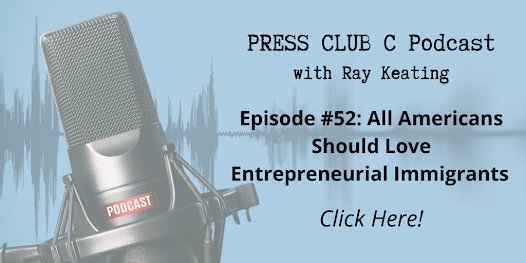by Ray Keating
The Keating Files – June 25, 2021
The phrase “trickle-down economics” gained prominence as a derogatory phrase hurled at supply-side economic policies of the 1980s by political opponents of President Ronald Reagan. However, it actually has a longer history, going back at least to the 1920s, again, as a way of attacking supply-side-oriented policies.
The trickle-down slur meant that across-the-board tax cuts benefited the wealthy at the expense of others, with perhaps a few benefits eventually trickling down to lower income groups.
The trickle-down attack gets dragged out time and again by those opposing tax relief and/or arguing for higher tax rates. For example, one member of a group of high-income individuals looking to raise taxes on themselves and other wealthy people, asserted in a recent op-ed at TheHill.com (“Why Biden's proposed marginal tax rate increase isn't enough”) that the “Reagan-era tax cuts and trickle-down economics … led to the massive income inequality that we see today.” How so? Well, that’s not explained, it’s just merely asserted.
I always find wealthy people who want to pay more in taxes, and demand that other high-income individuals pay more, interesting. Why? It’s clear that they love the idea of large government in a simple-minded way, while failing to grasp economic realities. For example, they completely miss the economic fact that wealthy individuals who invest or spend their own money will do far more for others than if those dollars were handed over to politicians and their appointees.
Think about it. Wealthy individuals have the resources to invest in new and/or growing businesses, and in turn, in creating goods and services desired or needed by others and employing people.
But what about the rich person who simply spends his money on forms of conspicuous consumption, like buying a bigger yacht? Well, who builds those yachts, and supplies the various materials and parts that go into such yachts? That’s right, it’s people up and down the income scale, including small business owners and their employees.
Indeed, high-income earners play a crucial role in the economy by accumulating wealth and thereby being able to invest in entrepreneurs, ideas and businesses, and therefore, in the investments, technologies and innovations that drive productivity, income and job growth. That’s not trickle-down economics. That’s just economics.
Meanwhile, raising taxes on upper-income earners in the hopes that government, run by politicians, will do something positive with tax dollars amounts to little more than going to the racetrack and putting a big wad down on longshots all day long. It’s gambling, with probably fewer payoffs than at the track.
After all, the incentives at work in government are not conducive to positive, productive outcomes. Politicians and bureaucrats spend other people’s money on programs and projects rooted in political incentives, and special-interest pressures and lobbying. For good measure, when something fails in government, the most likely result is that such failure is rewarded with more money and a larger staff.
Indeed, when you actually think about how government works, those who push for higher taxes and increased government spending – two central points of the Biden economic agenda – are engaging in true trickle-down economics. That is, dollars are sucked away from productive private-sector enterprises, handed over to politicians and their appointees, and one is left hoping that the economic damage will be limited, and that some sort of benefits might trickle down to the individuals that politicians presume to be helping. That’s all about politics, with little evidence of any economic thinking occurring.
In the end, supply-side economics is about providing relief from government burdens – such as through lower tax rates, reduced regulation and free trade – so that entrepreneurship, investment, and economic, income and employment growth can flourish. That’s the antithesis of trickle-down economics, or to use a different phrase, the antithesis of Biden-omics.
_________
Ray Keating is a columnist, novelist, economist, podcaster and entrepreneur. Keating has three new books out. Vatican Shadows: A Pastor Stephen Grant Novel is the 13ththriller/mystery in the Pastor Stephen Grant series. Get the paperback or Kindle edition at Amazon, or signed books at www.raykeatingonline.com. Past Lives: A Pastor Stephen Grant Short Story is the 14th book in the series. Get the paperback or Kindle edition at Amazon, or signed book at www.raykeatingonline.com. And the 15th book in the seriesWhat’s Lost? A Pastor Stephen Grant Short Story is available, again, at Amazon.comand signed books at www.raykeatingonline.com.
The views expressed here are his own – after all, no one else should be held responsible for this stuff, right?
You also can order his book Behind Enemy Lines: Conservative Communiques from Left-Wing New York from Amazon or signed books at RayKeatingOnline.com. His other recent nonfiction book is Free Trade Rocks! 10 Points on International Trade Everyone Should Know.
One of the best ways to enjoy Ray Keating’s Pastor Stephen Grant thrillers and mysteries is to join the Pastor Stephen Grant Fellowship! For the BEST VALUE, consider the Book of the Month Club. Check it all out at https://www.patreon.com/pastorstephengrantfellowship
Also, check out Ray’s podcasts – the Daily Dose of Disney, Free Enterprise in Three Minutes, and the PRESS CLUB C Podcast.
Check out Ray Keating’s Disney news and entertainment site at www.DisneyBizJournal.com.






